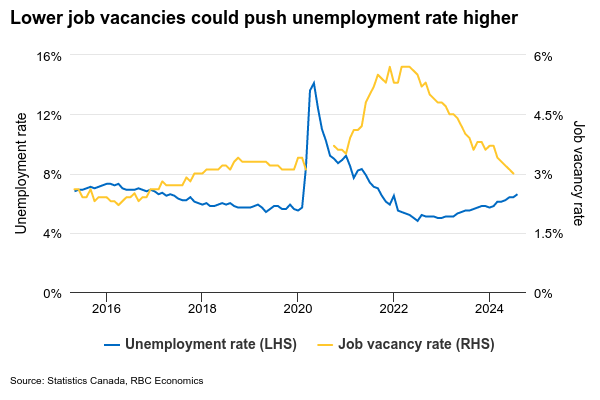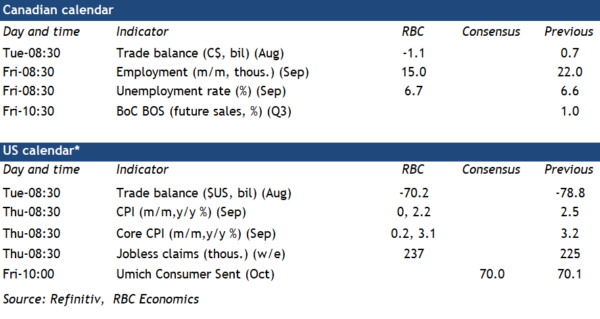The September jobs report and the Bank of Canada’s Business Outlook Survey will be closely watched for signs of more economic weakness as the central bank considers whether to accelerate the pace of interest rate cuts.
The U.S. Federal Reserve kicked off its cutting cycle with a 50 basis point reduction in September—larger than the 25 basis point cuts from the BoC so far—but a strong September U.S. jobs report lowered the odds that the larger than “normal” cut will be repeated. However, the BoC has been willing to diverge from the Fed on monetary policy when Canadian economic conditions warrant it.
On Friday, we expect the Canadian unemployment rate ticked up again to 6.7% in September from 6.6% in August. That’s 1.1 percentage points higher than a year ago and 1.9 percentage points above the lows after the pandemic. Much of the increase in unemployment has come from longer job search times, particularly for students entering the job market, rather than layoffs. Employment has continued to rise gradually, but not fast enough to keep up with rapid population and labour force growth. We expect that trend to continue in September with 15,000 jobs added, a modest slowing from 22,000 in August.
However, near-term risks remain for larger increases in unemployment. Job vacancies have continued to decline at a rapid pace (down more than 25% from a year ago) with early indicators (job postings on indeed.com) flagging that those declines continued into September. Wage growth has held up, but should continue to slow as hiring demand continues to cool.
Inflation indicators in the Q3 Business Outlook Survey on Friday will be analyzed for reassurance that price growth continues to slow, particularly in corporate pricing behaviour. The central bank is increasingly worried that the economy is slowing more than needed to get inflation sustainably back under control with Governor Tiff Macklem explicitly flagging risks that it could fall below the 2% target. While the start of the rate-cutting cycle and lower inflation could lead to some improvement in expected future sales and equipment investment, these gains are expected to remain minimal given the broader economic slowdown. BoC officials will also be watching for further deterioration in key capacity pressures, such as labour shortages and supply chain disruptions, which may signal deeper weakness in the economy. The Q2 survey already revealed labour shortages at their lowest level since the 2008/09 recession, outside of the pandemic period, underscoring softening labour demand and the risk of a sharper slowdown.
Week ahead data watch
The major data release in the U.S. will be the September consumer price index report on Thursday. Inflation pressures likely eased further, and we expect headline price growth decelerated from 2.5% year-over-year in August to 2.2%, thanks to lower energy prices. Excluding volatile energy and food components, core CPI likely came in at 3.1%, edging down from 3.2% in August.
On Tuesday, Canadian exports in August likely declined by 3% given the 6% reduction in oil prices, which natively impacted the energy trade balance. Imports are expected to lower by 0.6%, bringing the trade deficit to $1.1 billion.
We expect the U.S. trade deficit to narrow to US$70.2 billion from US$78.8 billion in the prior month. The goods deficit narrowed in August as well on higher exports (2.4%), and lower imports (-1.6%), according to the advance indicator.


